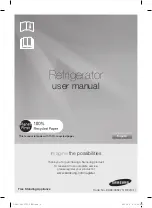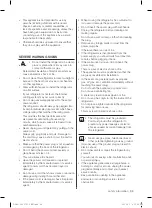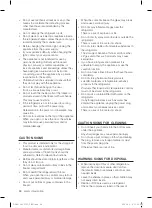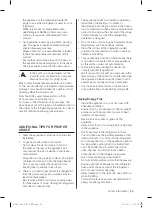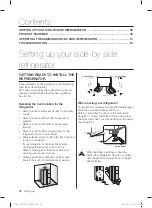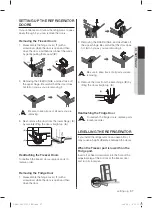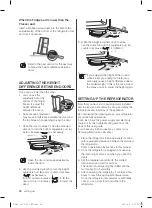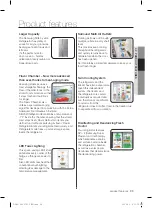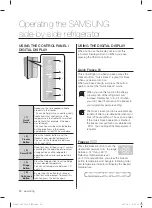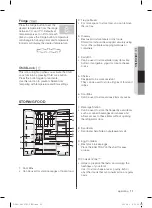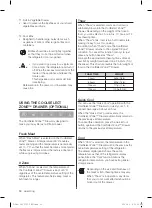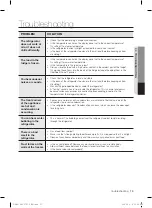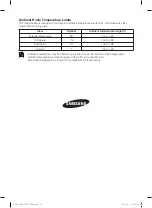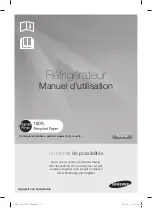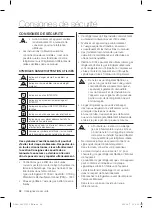
safety information
_05
the appliance or the rating label inside the
fridge to see which refrigerant is used for your
refrigerator.
When this product contains fl ammable
gas(Refrigerant R600a) contact your local
authority in regard to safe disposal of this
product.
Cyclopentane is used as a insulation blowing
•
gas. The gases in insulation material require
special disposal procedure.
Please contact your local authorities in regard
to the environmentally safe disposal of this
product.
Ensure that none of the pipes on the back of
the appliances are damaged prior to disposal.
The pipes shall be broke in the open space.
In the event of a power failure, call the
local offi ce of your Electricity Company
and ask how long it is going to last.
Most power failures that are corrected in an hour
or two will not affect your refrigerator temperatures.
However, you should minimize the number of door
openings while the power is off.
But should the power failure last more than
24hours, remove all frozen food.
For doors or lids fi tted with locks and keys, the
keys be kept out of the reach of children and not in
the vicinity of the refrigerating appliance, in order to
prevent children from being locked inside.
ADDITIONAL TIPS FOR PROPER
USAGE
Allow the appliance to stand for 2 hours after
•
installation.
To get best performance of product,
•
Do not place foods too closely in front of
-
the vents at the rear of the appliance as it
can obstruct free air circulation in the freezer
compartment.
Wrap the food up properly or place it in airtight
-
containers before put it into the fridge freezer
Do not put any newly introduced food for
-
freezing near to already frozen food.
There is no need to disconnect the refrigerator
•
from the power supply if you will be away for
less than three weeks.
But, remove all the food if you are going away
for three weeks or more. Unplug the refrigerator
and clean it, rinse and dry.
The appliance might not operate consistently
•
(possibility of defrosting of contents or
temperature becoming too warm in the frozen
food compartment) when sited for an extended
period of time below the cold end of the range
of temperatures for which the refrigerating
appliance is designed.
Do not store food which goes bad easily at low
•
temperature, such as bananas, melons.
Place the ice tray at the originally provided
•
posistion by manufacturer in order to achieve
optimal ice-freezing.
Your appliance is frost free, which means there
•
is no need to manually defrost your appliance,
as this will be carried out automatically.
Temperature rising during the defrost can
•
comply with ISO requirement.
But If you want to prevent an undue rise in the
temperature of the frozen food while defrosting
the appliance, please wrap the frozen food in
several layers of paper such as newspaper.
Any increase in temperature of frozen food
•
during defrosting can shorten its storage life.
Saving Energy Tips
Install the appliance in a cool, dry room with
-
adequate ventilation.
Ensure that it is not exposed to direct sunlight
and never put it near a direct source of heat
(radiator, for example).
Never block any vents or grilles on the
-
appliance.
Allow warm food to cool down before placing it
-
in the appliance.
Put frozen food in the refrigerator to thaw.
-
You can then use the low temperatures of the
frozen products to cool food in the refrigerator.
Do not keep the door of the appliance open for
-
too long when putting food in or taking food
out. The shorter time for which the door is
open, the less ice will form in the freezer.
Clean the rear of the refrigerator regularly.
-
Dust increases energy consumption.
Do not set temperature colder than necessary.
-
Ensure suffi cient air exhaust at the refrigerator
-
base and at the back wall of the refrigerator.
Do not cover air vent openings.
Allow clearance to the right, left, back and top
-
when installing.
This will help reduce power consumption and
keep your energy bills lower.
CAUTION
DA99-03327N-1 EN.indd 05
DA99-03327N-1 EN.indd 05
2012.3.5 4:55:50 PM
2012.3.5 4:55:50 PM

